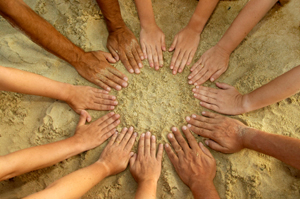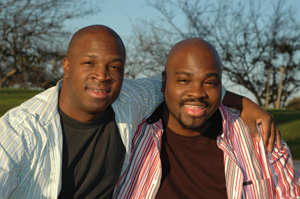
Services
Groups
Psychotherapy
Trainings
Consultationllllllslllllssllls
 Groups
are powerful. With assistance from a safe and supportive environment,
individuals have a rare opportunity to work amongst their peers and
receive honest, helpful, and challenging feedback. By paying close
attention to developing trust amongst the group members and leader,
and by speaking about the level of trust each person feels,
a more intimate working environment is possible. What can
be uniquely helpful about group is that people tend to listen to
peers and take in their feedback differently than with authority
figures. Groups are certainly about peer interactions.
Groups
are powerful. With assistance from a safe and supportive environment,
individuals have a rare opportunity to work amongst their peers and
receive honest, helpful, and challenging feedback. By paying close
attention to developing trust amongst the group members and leader,
and by speaking about the level of trust each person feels,
a more intimate working environment is possible. What can
be uniquely helpful about group is that people tend to listen to
peers and take in their feedback differently than with authority
figures. Groups are certainly about peer interactions.
The groups I currently lead (see calendar for dates) are based on two primary principles. The first is Family Systems Theory. This theory suggests our unique family of origin has imprinted upon us very specific ways of dealing with the world, and we find our family dynamics recreated in numerous environments, including group therapy. By paying close attention to understanding family dynamics, help may be offered to repair and re-work original hurts and injuries that continue to impact one’s current relationships. This allows the individual to understand more clearly what they actually need instead of the more familiar (and often dysfunctional) family dynamic.
The second principle is called the “here and now” dynamic. In groups, participants bring their issues and find some of the same dynamics and issues that exist outside of the group room. For example, an individual whom is isolated will find some degree of isolation in the group. When this isolation is addressed and worked with, a better understanding of this dynamic can be reached.
Group Offerings:
San Francisco
Long-term psychotherapy groups for gay men, initial commitment of four months.See Calendar for further information and dates.
My approach to individual psychotherapy is based on several theoretical principles. I practice with a general framework on psychological principles impacted by societal variables, such as gender, sexual orientation, and experience with trauma (this is sometimes referred to as Psychodynamic Theory).
A good deal of focus is within a “family systems” framework. Family systems theory suggests we are all raised in unique environments, each reflecting a stated (and often unstated) system, reflecting the power dynamics, general health of family, whether abuse has occurred, and what priorities childrens’ needs are given. It is generally believed that we carry with us into adulthood the framework of our family system, and it often gets recreated in adult relationships, sometimes to our disappointment, frustration and joy.
One goal in therapy may be to become better acquainted with the family system one was raised in, thus to have better insights, understanding and empathy about the impact on current issues and problems. This does not always translate to change as it helps to examine specifically what “payoffs” continue to reinforce a familiar habit or behavior scenario. For example, someone emotionally abused as a child may grow up to distrust healthy adult relationships, and thus may seek out the more familiar instance of an abusive relationship. What one gains is the familiarity and the assurance that this is a kind of relationship that s/he/they know how to operate in, and a more healthy relationship may provide more anxiety and uncertainty about what will occur.
In addition to the family systems and psychodynamics theories, I work in Cognitive-Behavioral Theory, when specific behavioral issues are involved, or when requested. This theory helps particularly overt manifestations of behavior that are in question to change (such as smoking, drinking, exercise and eating behaviors).
Although much of individual therapy can be long-term in nature, I am also comfortable in short-term modes focusing on very specific issues, as well as clients’ desire and goal to spend a limited time in therapy.
With couples, I generally suggest three issues to begin with: 1) What is a secret that one or both of you are holding on to that would be difficult (or impossible) to share? 2) What communication patterns are evident (or for now, not so evident) that are impacting your relationship and causing some of the current distress? 3) What impact are various major life issues having on the relationship?
Couples work is an ongoing dialogue amongst the three of us, attempting to bring out and emphasize some form of the above issues. (Please note, some couples do not fall into the above mentioned framework, and thus the work would take a different focus, but may fall along the same general lines). It is helpful if the couple takes homework to be done during the week, most commonly this is the “Couples Chat” of one hour that attempts to continue the practice which has begun in therapy.
It is important to note that although this is an attempt to provide an overview of my counseling practice, there are always exceptions that don’t conform to these guidelines. With both individuals and couples, I ask clients to consider the first session as an “Introduction and Overview”, thus both client(s) and myself can have an initial assessment of whether work here seems appropriate and helpful.
Group work frameworks are elaborated separately on the group work pages.
I am available
for trainings on the following topics:
- Gay Men’s Psychosocial Issues
- Psychotherapy Group Work for Gay/Bisexual Men
- Supervision, Psychotherapy Group Work
- Dating Skills for Gay Men
- Flirting Skills for Gay Men
- Dating/Flirting Skills for Everyone Else
- HIV/AIDS, Psychosocial Issues
- Burnout/Stress Management (Health Care, Social Work and Psychotherapy emphasis)
- Developing
a Successful Private Practice
Please click Experience to see a variety of other topics that I have also presented.
Target audience includes both professionally and client based. Professional settings have included Federal, State and Local Government programs, private health care businesses, community organizations, community groups (including informal interest groups) and staff departments of hospitals and clinics.
Trainings can be in flexible formats: One to two hours, half-day, full-day, or extended several days.
I am a LCSW with appropriate CEU’s to lead supervision groups for MSW’s and MFTI’s working on licensure hours. I have also provided individual supervision over the past fifteen years. With colleagues I have provided case consultation on clinical issues dealing with gay men, HIV, and group work.
site designed by scotteatondesign
| tel: 415.552.9408 |
email: jammoran@aol.com |

